Type: Pu Erh
Origin: Yunnan, China
Price: Free sample (regular price - $5.00 for 1oz.)
Vendor: Rishi Tea
Brewing Method: Per Instructed - 1 teaspoon of leaves, 1 cup of filtered water, heated to 212°F, steeped for 5 - 6 minutes
Overall Score: 4.0 out of 5
Vanilla Mint is a pu erh base blend with vanilla, peppermint, cinnamon, and licorice root – all of which are organic ingredients. My first thought when the aroma of the dry leaf hit me is that is smells like toothpaste… and I mean that in a good way. It has a fresh scent with the mix of peppermint and vanilla. I can smell a bit of the cinnamon, as well. The dry leaves are a colorful sight. The small, black pu erh leaves are twisted within the mix of green peppermint, and brown cinnamon and licorice root.
The steeped tea was fun to pour out of the teapot. When I started to pour the tea into the pitcher it was a light yellowish orange color, then all of a sudden a blood red color comes out of the spout of the teapot. This gave the tea a dark red hue. The aroma of the tea is a mix of vanilla and mint with a licorice aroma in the background.

Wow, what an interesting combination of flavors and sensations. At first I taste the sweet vanilla, and then I feel the coolness of the mint. I few seconds later I feel the heat from the cinnamon in the back of my throat.
The tea isn’t as heavy or bold as I thought it would be. Steeping pu erh for five minutes scared me because I know how bold they can be. However, this one tastes more like an herbal tea. The only thing I’m getting from the pu erh is some astringency. It isn’t bitter at all. In fact, the sweetness from the vanilla and the coolness from the mint make it rather refreshing.
Tuesday, July 27, 2010
Rishi Tea’s Vanilla Mint Review
Saturday, July 24, 2010
Rishi Tea’s Houjicha Review
Type: Green
Origin: Kagoshima Prefecture, Japan
Price: Free sample (regular price - $3.00 for 1oz.)
Vendor: Rishi Tea
Brewing Method: Per Instructed - 1 teaspoon of leaves, 1 cup of filtered water, heated to 185°F, steeped for 3 - 4 minutes
Overall Score: 4.3 out of 5
Houjicha is an organic, roasted green tea from Japan. The aroma of the dry leaves is toasty, woody, and slightly grassy. The leaves are various shades of brown and are long and flat with quite a few stems in the mix, as well.
The tea smells woody and nutty. It definitely doesn’t hold back the roasted aroma either. It reminds of oolong tea because it lacks the fresh scent that most steeped green teas have. The liquor is a yellowish orange color.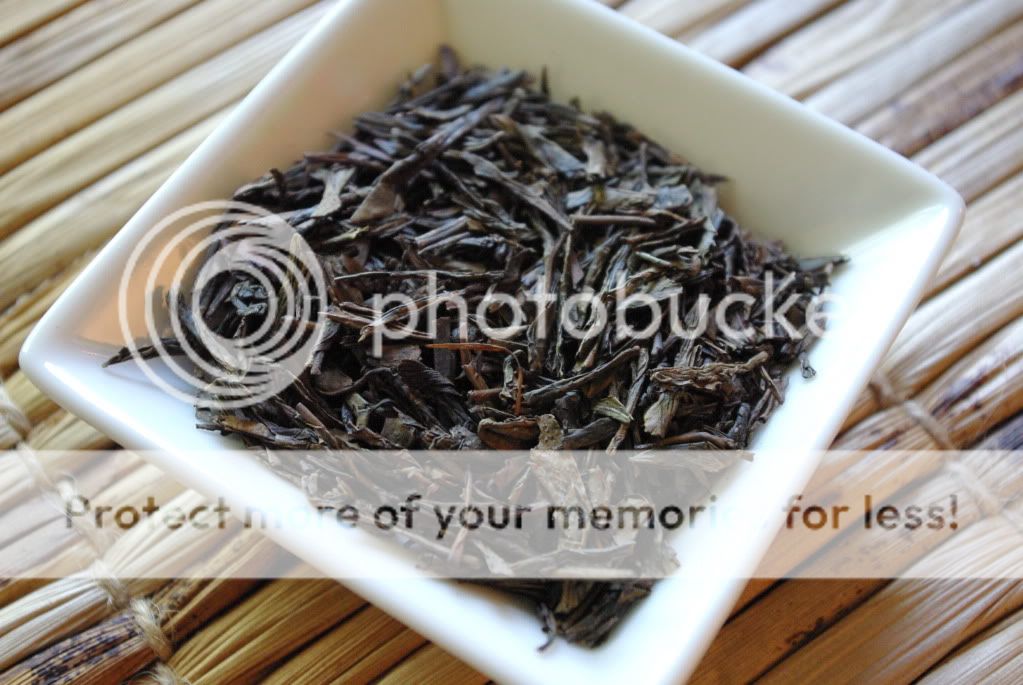
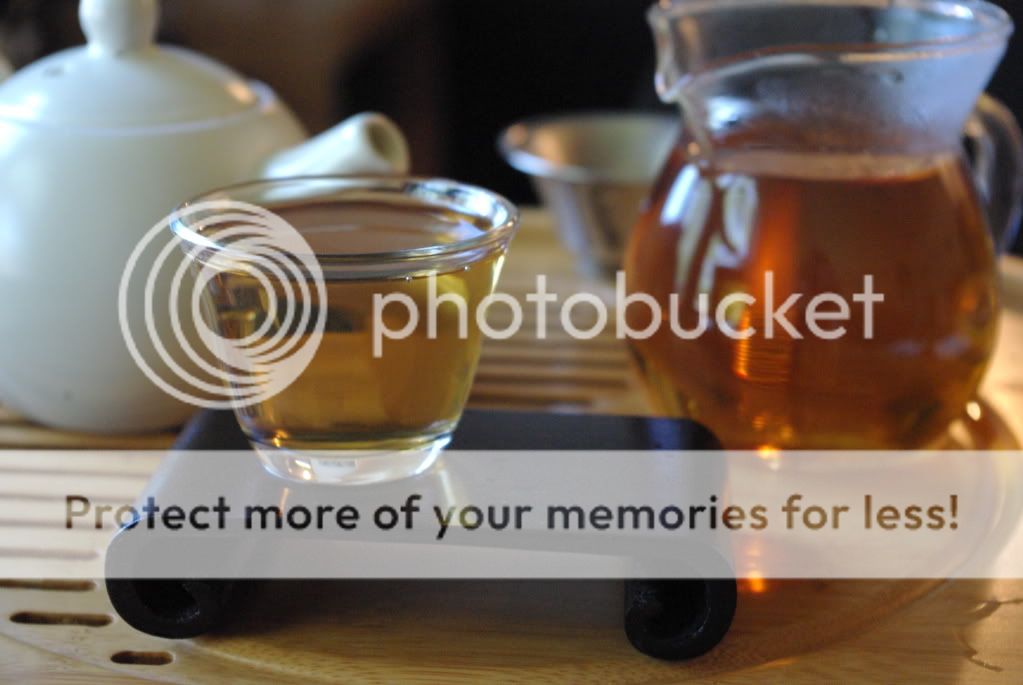
The taste is… unlike other green teas. It tastes nutty and buttery. It also has a sweet, honey-like flavor to it. There isn’t much of a grassy or vegetal taste to this green tea. The boldness of this tea matches that of oolong tea – roasted notes that linger for quite some time.
This should not be an intro tea to those trying greens for the first time as it is rather bold and astringent. The tea isn’t bitter, but the intensity of the roasted flavor can be a surprise. Although, if you want to drink green tea and you don’t particularly like the grassy taste, this would be a good one to try as it has darker qualities similar to oolong and black tea.
With that said, this is a great tea for those who are tired of the same old stuff. This Houjicha is a rather complex tea and it surprises me every time I take another sip. I have to remind myself that this is a green tea even though the taste is unlike anything else. The fact that it is organic is a major plus, too.
Saturday, July 17, 2010
My New Tea Table Guests
While shopping the strip in Gatlinburg, TN, my boyfriend and I visited the China Bazaar store. It was mostly filled with martial art swords and knives, but it also had some Asian style figurines. I spotted the bright red foo dogs nestled in a corner of a shelf. I have been looking for a pair of these statues to join me at my tea table, but I couldn’t find any for the right price and of the right size… until now.
Foo dogs – also called fu dogs, fu lions, lions of Buddha, stone lions, or Chinese guardian lions - are the creatures that sit outside of Chinese palaces, temples, and even homes to act like guardians. The dogs always come in a pair; the male is holding a ball under his paw and the female has a cub on her paw.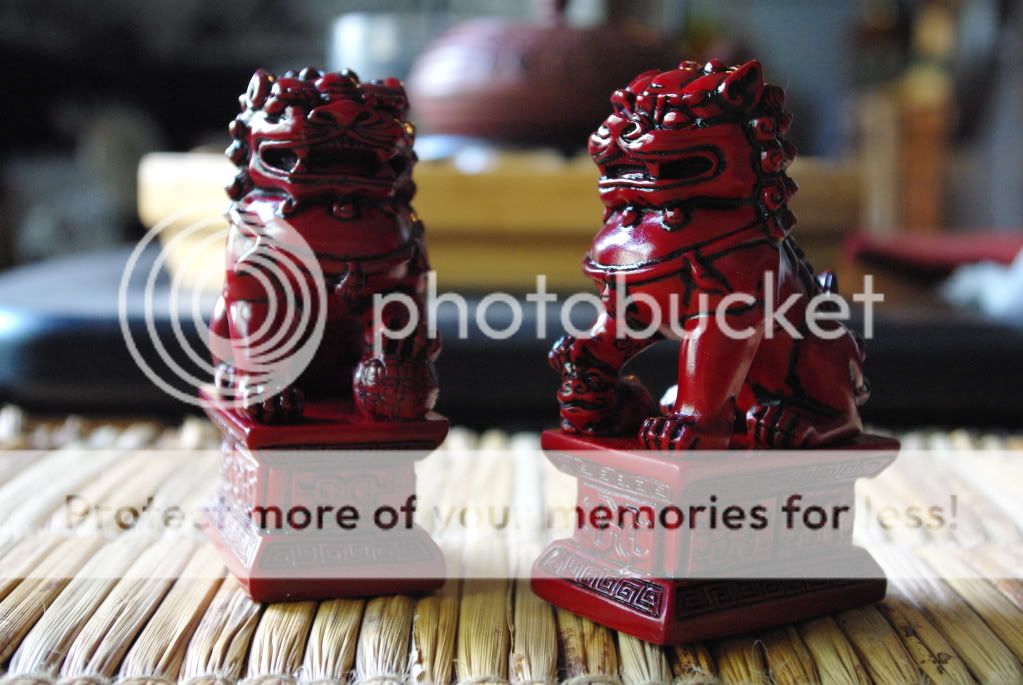
Tuesday, July 13, 2010
Rishi Tea’s Dragon Well Review
Type: Green
Origin: Zhejiang, China
Price: Free sample (regular price - $5.50 for 1oz.)
Vendor: Rishi Tea
Brewing Method: Per Instructed - 1 teaspoon of leaves, 1 cup of filtered water, heated to 180°F, steeped for 2 - 3 minutes
Overall Score: 4.8 out of 5
This particular Dragon Well is organic. The leaves are pressed flat so that they are long, slender pieces marbled with various shades of green. The aroma, however subtle, is toasty and grassy. The dry leaves smell buttery with a rich sweetness.
While the leaves are steeping, the tea has a fresh, sweet, buttery aroma. The liquor is a light greenish yellow color.
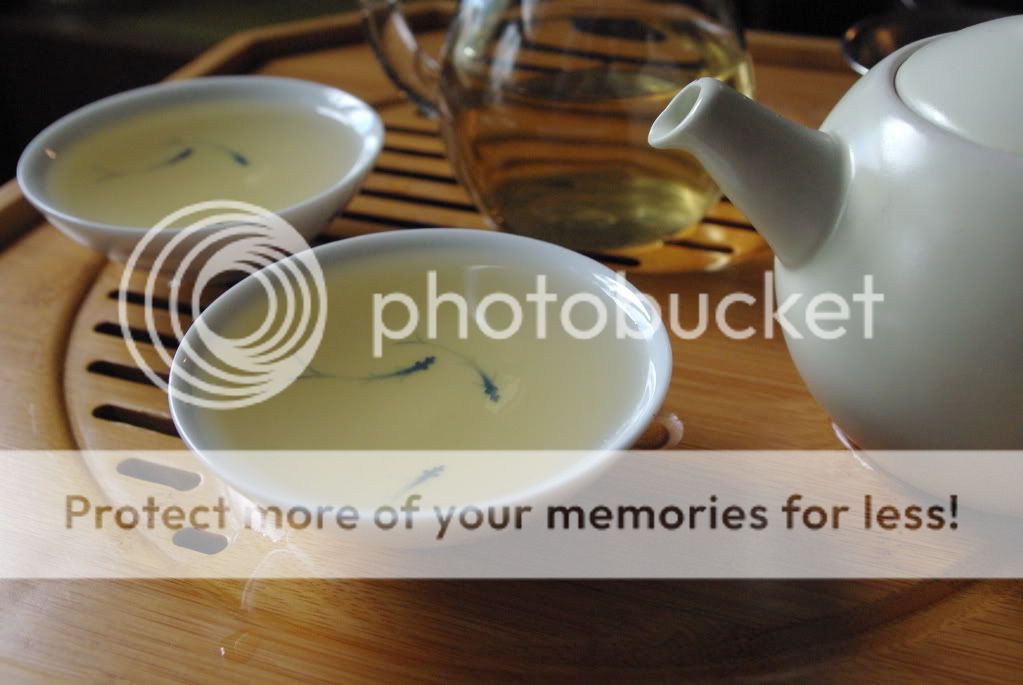
The taste is quite buttery and creamy at first. As I continue to sip I can taste the subtle nutty flavors mingle with the slight grassiness. No bitterness at all… in fact, I find it rather sweet. The tea also lacks any unpleasant dryness that sometimes accompanies green teas.
This particular Dragon Well seems to be creamier than others that I have had. Usually the nutty flavor is front and center which kicks the rest of the flavors to the background. But, this one holds that buttered toast flavor up front, making it a savory tea.
Sunday, July 11, 2010
Dawn and Dusk Cup
Dawn and Dusk. At least that is what I am calling the new cup that I bought while on vacation last week. My boyfriend and I stumbled upon the Black Bear Tea Company while browsing the Mountain Mall in Gatlinburg, TN.
Thankful for some air conditioning on a day in which I am sure hit over 100°F, we took our time looking at every piece of tea-inspired item that this little store had to offer. I took a closer look at their tea ware and their black tea as I was looking to buy one or more of those. However, I do not recommend buying any tea ware from this particular store because it is extremely over priced. They wanted $119 for what looked like a simple 150ml yixing pot. There was also a $249 price tag on two approximately 200ml yixing pots with six tiny cups. To compare, I have a 250ml yixing pot that I bought for $25. There was no way I was going to pay those prices!
On the other hand, the tea was reasonably priced. It was $9.95 for each 2oz. bag of loose leaf tea or buy six bags and get one free. I bought some Black Orange tea and some Kenilworth Ceylon to satisfy my diminishing black tea stash at home.
Ok, so I said I was going to pass on the tea ware, but yet I began this post talking about the new cup I bought. I caved, alright!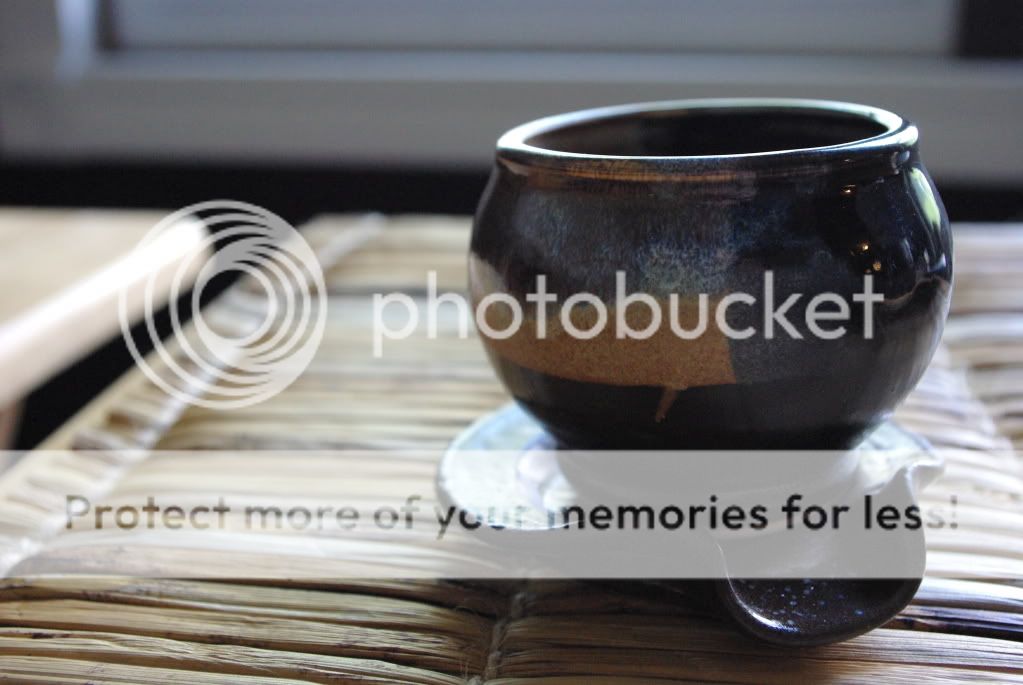
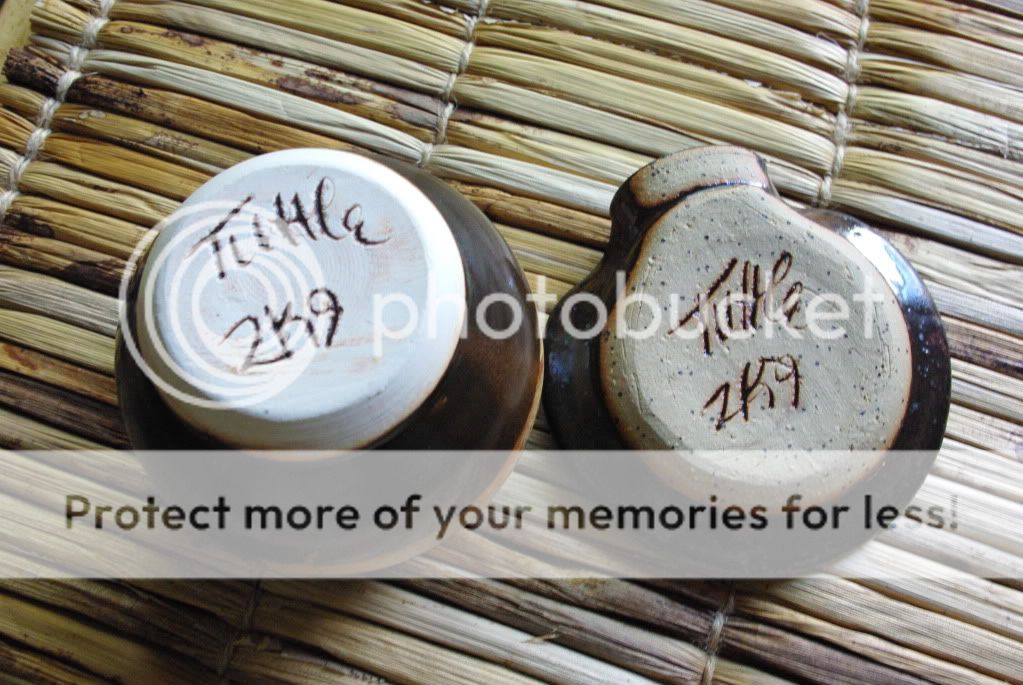
This beautiful cup and saucer caught my eye and when the store clerk saw me looking at it, he explained that it was hand made with a signature on the bottom. The price of $25 made me wince, but it is hand made, with a signature, and my interpretation of the piece is an “opposite” – one of my favorite forms of art.
Allow me to explain. I have a thing for opposites. I like yin yang symbols, black and white clothes or paintings, night and day art, etc… something about seeing the extremes of a spectrum right next to each other is simply amazing to me.
Hence why I call this cup “Dawn and Dusk” and also why I bought it. The yellows and oranges represent the dawn while the blues and blacks represent the dusk. Cool, eh?
Thursday, July 1, 2010
Kalahari’s Zambezi Red Chai Review
Type: Rooibos
Origin: South Africa
Price: Sample (regular price - $3.50 for 20 Pouches)
Vendor: Kalahari
Brewing Method: 1 teabag, 1 cup of filtered water, heated to 200°F, steeped for 4 - 5 minutes
Overall Score: 3.8 out of 5
Zambezi Red Chai is a rooibos base blend with ginger, cinnamon, cardamom, cloves, and black pepper. The dry leaf aroma smells of chai spices with the ginger and cloves standing out more than the rest. I cannot see much of the dry leaf blend because of the opaque tea bag, but from what I can make out there lots of colorful specs of spices throughout.
The cinnamon and clove aromas are more distinguishable as the tea is steeping. The liquor before milk is added is a light copper color. The liquid is rather foggy, but I have found that to happen whenever cinnamon is an ingredient in the blend. After milk is added, the liquid becomes a light brown or tan color.
The taste is… warm. I can taste the cloves, cinnamon, and ginger which provides for the overall warm feeling. The milk helps cut some of the harshness from the spices, but I can still feel the heat in the back of my throat.
This rooibos base chai seems to be sweeter than the Assam base chai’s. There is a lack of bitterness and astringency that normally comes with the Assam base blends. It is also mellower than chai’s made with black tea… even though the cloves are always relentless no matter what else is in the blend.







